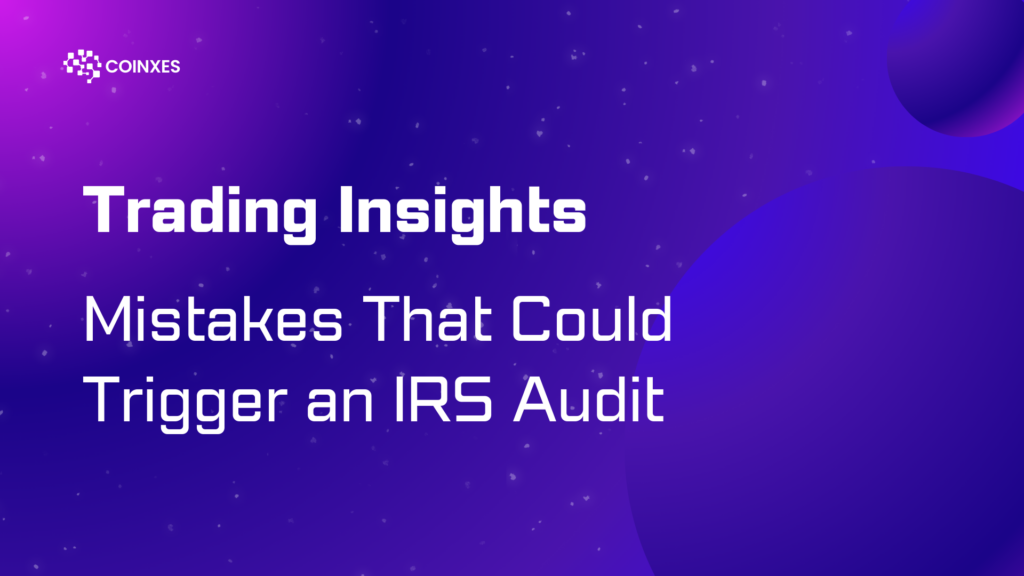Trading Insights: Mistakes That Could Trigger an IRS Audit
Introduction
The rise of cryptocurrency has opened up vast opportunities for retail and institutional investors alike. But as crypto trading volumes surge, so does scrutiny from regulators—particularly the Internal Revenue Service (IRS). While traders often focus on profits and portfolio growth, compliance with tax obligations is just as critical.
Failing to properly report crypto activity can trigger a costly IRS audit, leading to penalties, back taxes, and even legal consequences. Whether you’re casually trading Bitcoin or day-trading altcoins on high volume, it’s essential to understand the common crypto tax mistakes that catch the IRS’s eye.
In this article, we explore the most frequent trading errors that can draw IRS attention, analyze how competitors are handling crypto tax education, and provide best practices to stay compliant in 2025 and beyond.
Why Crypto Traders Are on the IRS Radar
Cryptocurrency once flew under the radar. Not anymore.
With billions in crypto assets changing hands daily, the IRS is deploying blockchain analytics tools, third-party data collection, and enhanced reporting requirements for centralized and decentralized exchanges.
The 2025 tax year includes broadened crypto tax rules under the Infrastructure Investment and Jobs Act, mandating that platforms like Coinbase, Kraken, Binance US, and Robinhood Crypto report detailed user activity.
For the IRS, crypto is no longer a “gray area”—it’s a top enforcement priority.
Mistake 1: Not Reporting Crypto Trading at All
The most glaring red flag? Omitting crypto trades entirely from your tax return.
Many traders mistakenly believe that crypto-to-crypto swaps, DeFi activity, or NFT flips aren’t reportable unless they cash out to fiat. This is false. The IRS views crypto as property, and nearly every transaction is a taxable event, including:
- Trading BTC for ETH
- Selling an NFT for USDC
- Swapping coins on Uniswap or PancakeSwap
- Using crypto to purchase goods or services
Each of these events requires accurate cost basis tracking and must be reported on Form 8949 and summarized in Schedule D.
Ignoring this can result in audit flags, especially now that major exchanges are sending 1099 forms directly to the IRS.
Mistake 2: Incorrect or Missing Cost Basis
Your cost basis—the original value of your crypto at the time of acquisition—is critical for calculating capital gains or losses. Yet many traders fail to track this, especially when assets are:
- Acquired from multiple sources (airdrops, mining, staking)
- Traded across multiple exchanges
- Moved between wallets with no documentation
Without clear records, you risk overreporting gains or underreporting losses, both of which can trigger an IRS inquiry.
Tax software like Koinly, CoinTracker, TokenTax, and ZenLedger can automate this process, syncing wallet data and exchange histories to calculate gains/losses accurately.
Mistake 3: Misclassifying Income vs. Capital Gains
Cryptocurrency income isn’t just about capital gains—it can also include:
- Staking rewards
- Mining income
- Airdrops and forks
- Referral bonuses or freelance gigs paid in crypto
These are taxed as ordinary income at the fair market value on the day received, not as capital gains. Failing to properly classify these transactions or reporting them all as capital gains can lead to discrepancies that flag your return for audit.
Tools like TaxBit and CoinLedger offer dashboards that separate income and gains based on transaction type, making compliance easier.
Mistake 4: Using Unregulated Exchanges Without Documentation
Traders using non-U.S. or unregulated exchanges—such as KuCoin, OKX, or Bybit—may believe they’re off the IRS radar. Think again.
The IRS now leverages global data-sharing agreements and third-party subpoenas to access offshore platform records. If you’ve transferred crypto to or from foreign accounts, especially amounts over $10,000, you may be subject to FBAR (FinCEN Form 114) or FATCA (Form 8938) reporting.
Failure to disclose these holdings can lead to severe penalties, even if you made no gains. Keep meticulous records of trades and wallet addresses—even on decentralized platforms—and include them in your annual tax return.
Mistake 5: Incomplete NFT and DeFi Reporting
The NFT and DeFi boom has added complexity to tax filings.
Selling an NFT, earning yield from a liquidity pool, or borrowing from a DeFi lending platform—each can generate taxable activity. Yet, because many platforms lack standardized tax reporting, manual tracking is required.
Mistakes include:
- Not recording NFT minting and sale dates
- Ignoring gas fees in cost basis calculations
- Failing to report token earnings from yield farms or LP rewards
As IRS guidance catches up to DeFi, reporting errors in this space will draw attention during audits.
How Competitors Handle Crypto Tax Education
Top exchanges like Coinbase, Kraken, and Binance US have rolled out dedicated crypto tax centers, integrating tools such as CoinTracker or custom CSV exports for reporting.
Emerging platforms like Bitget, OKX, and Crypto.com are also investing in user tax guides, real-time P&L dashboards, and regulatory alerts to help users stay compliant.
By contrast, exchanges that fail to educate users on tax responsibilities may find themselves and their users under greater regulatory scrutiny in the U.S. and abroad.
Tips to Avoid an IRS Audit for Crypto Trading
- Keep detailed records of all crypto activity (including wallet transfers)
- Use reputable crypto tax software or work with a CPA experienced in digital assets
- Don’t ignore small gains or assume low-value transactions don’t matter
- Reconcile every transaction across wallets and exchanges
- Double-check all 1099-B, 1099-MISC, or 1099-K forms received from exchanges
- Don’t forget to report airdrops, staking, and DeFi rewards
- File foreign asset disclosures if using non-U.S. platforms
Conclusion
As crypto matures, so too does the oversight from tax authorities. In 2025, cryptocurrency trading is no longer a loophole or gray zone—it’s a fully monitored sector of the U.S. tax code.
Avoiding an IRS audit requires more than just filing on time. It means understanding the nuances of crypto tax rules, reporting every taxable event, and using tools and strategies to stay accurate and transparent.
If you’re serious about trading crypto, you need to be just as serious about your compliance strategy.
